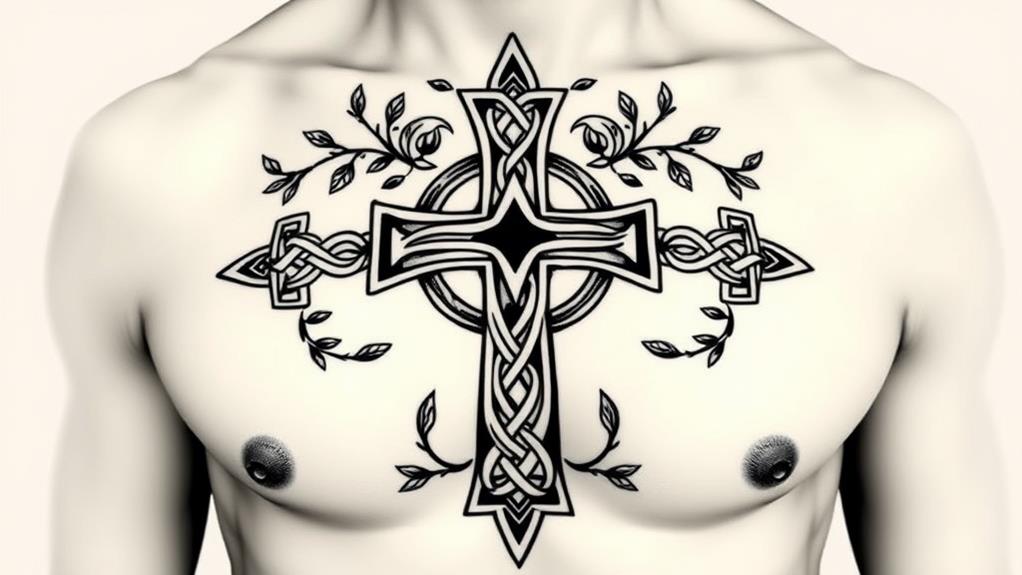The Jerusalem Cross isn't just a beautiful design; it's a symbol of my faith and odyssey. Its central cross and four smaller ones remind me of Christ's wounds and the Gospels. I see it as my badge of honor for completing a sacred trek, similar to how Crusaders and pilgrims viewed their tattoos. When I look at it, I'm reminded of the sacrifices and commitments I've made. It's not just ink on my skin; it's a part of my spiritual expedition. If you want to understand more about how a Jerusalem Cross tattoo can represent your own faithful journey, stick around.
Origins of the Jerusalem Cross
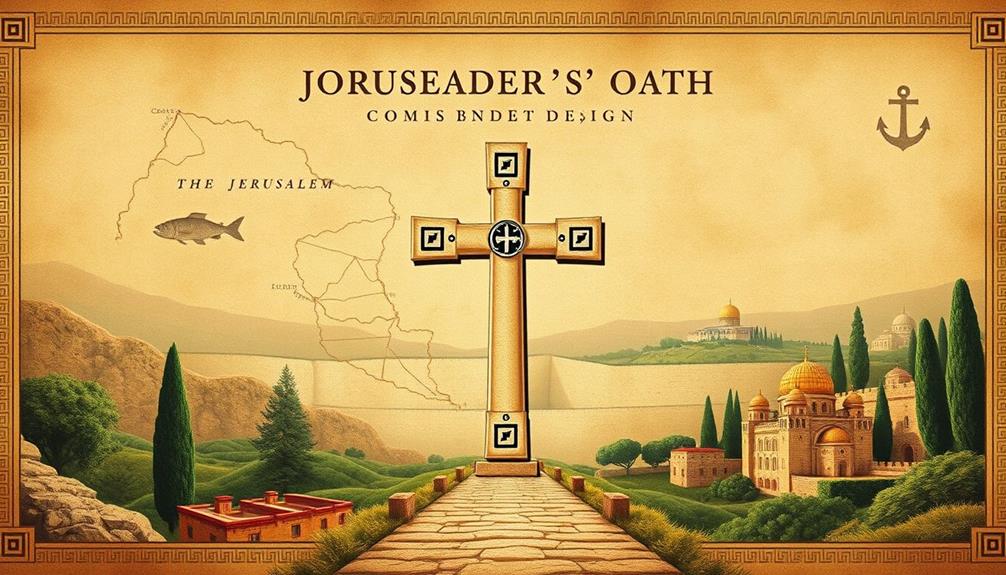
The Jerusalem Cross, a symbol steeped in history and significance, can trace its origins back to the 11th century. As I explore the rich fabric of its past, I'm struck by the myriad of historical influences that have shaped this iconic emblem.
From the Crusaders who proudly bore it on their shields and banners, to the noble houses of Europe who adopted it as their own, the Jerusalem Cross has undergone countless cultural adaptations throughout the ages.
What fascinates me most is how this symbol has managed to transcend its original framework and take on new meanings in different eras. It's a reflection of the enduring power of symbolism and the human desire to find meaning in the world around us.
As I study the intricate design of the Jerusalem Cross, I'm reminded of the complex interplay between history and art, and how the two are forever intertwined in the creation of iconic imagery.
Symbolism and Meaning
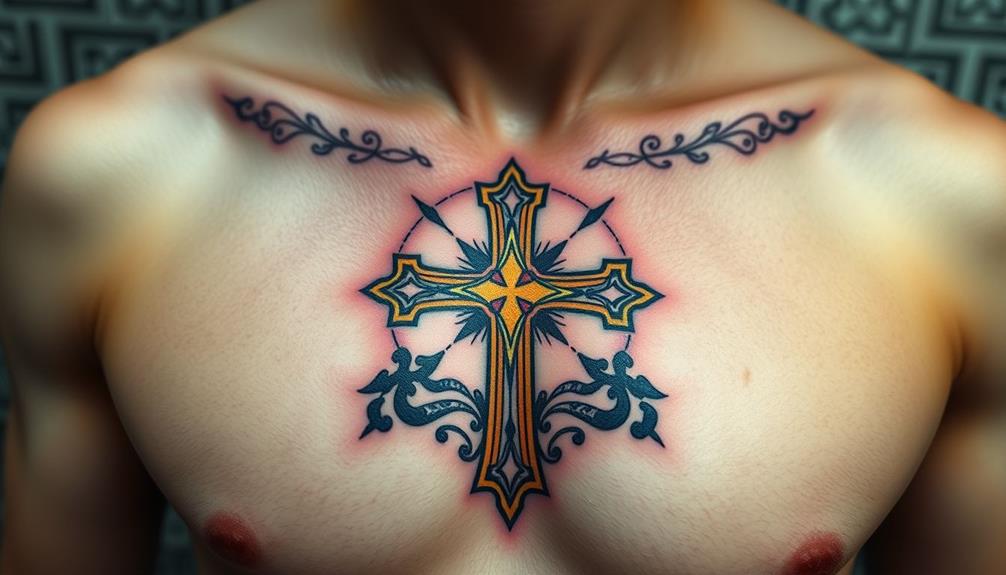
Delving into the symbolism and meaning behind the Jerusalem Cross, I find myself enthralled by its deep significance. This iconic symbol carries a significant spiritual weight, representing the convergence of divine grace and human devotion.
- The five crosses signify the five wounds of Christ, reminding me of His ultimate sacrifice and the redemption He offers.
- The large central cross embodies the strength and steadfast commitment of my faith, while the four smaller crosses represent the four Gospels, spreading the message of salvation to all corners of the world.
- It's a visual representation of my personal odyssey, a reflection of the trials and triumphs I've experienced on my spiritual path.
- The Jerusalem Cross also symbolizes the universal nature of Christianity, transcending cultural and geographical boundaries to unite believers worldwide.
- Its intricate design invites contemplation, drawing me deeper into the mysteries of my faith and inspiring me to live a life of purpose and devotion.
Through its rich symbolism and significant spiritual significance, the Jerusalem Cross becomes more than just a tattoo design; it becomes a powerful expression of my identity as a follower of Christ, forever etched into my skin and soul.
Pilgrimage Tattoos in History
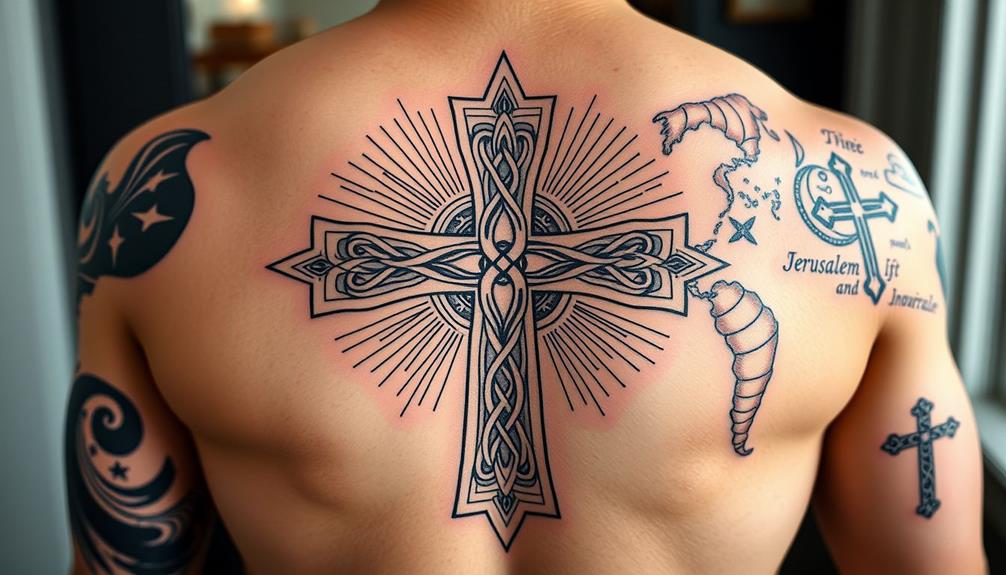
The history of pilgrimage tattoos is a fascinating odyssey that spans centuries and cultures.
These tattoos, often acquired during spiritual travels, carry deep symbolism and tradition.
Let's investigate the origins and significance of these meaningful markings.
Historical Tattoo Origins
In traversing the annals of history, we find that pilgrimage tattoos have long been a cherished tradition among devout travelers.
These inked symbols carry significant cultural importance and serve as tangible reminders of the ancient rituals that pilgrims partake in during their spiritual odysseys.
Let's investigate some fascinating aspects of these historical tattoo origins:
- Pilgrimage tattoos were often seen as badges of honor, marking the completion of a sacred voyage and the fulfillment of a solemn vow.
- Many pilgrims believed that these tattoos held protective powers, shielding them from harm and illness as they maneuvered treacherous paths.
- The designs of these tattoos were deeply rooted in religious iconography, featuring crosses, saints, and other holy symbols that held special meaning for the bearer.
- Pilgrimage tattoos weren't merely decorative; they were an integral part of the pilgrim's identity, signifying their steadfast faith and devotion.
- These tattoos were often applied by skilled artisans who used traditional methods passed down through generations, ensuring that each design was imbued with the weight of history and tradition.
Symbolism and Tradition
Disentangling the intricate fabric of pilgrimage tattoos, we find a rich symbolism and tradition that transcends time.
These tattoos aren't mere ink on skin; they're significant faith expressions, embodying the pilgrim's spiritual expedition and devotion. Each design tells a story, a confirmation to the bearer's cultural significance and religious commitment.
Historically, receiving a tattoo during a pilgrimage was similar to getting a sacred stamp, marking the completion of a spiritual quest. The Jerusalem Cross, for instance, symbolizes the wearer's voyage to the Holy Land, a physical emblem of their faith.
These tattoos weren't just personal reminders, but also public declarations of one's beliefs and values.
Over time, this practice has evolved, but the core symbolism remains unchanged.
Today, pilgrimage tattoos continue to be a powerful medium of faith expression, connecting the past with the present, and the individual with the divine.
Modern Faith and Tattoo Culture
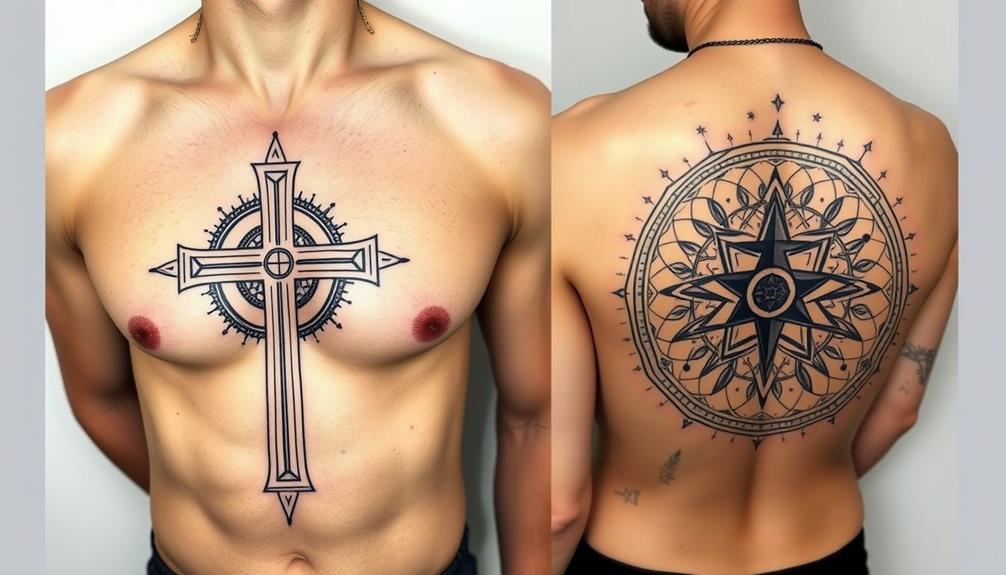
Through the intricate threads of modern faith and tattoo culture, we can begin to understand the complex relationship between personal belief and body art.
Today, tattoos aren't just seen as mere decorations but as significant statements of faith and identity. The Jerusalem cross, with its rich symbolism and deep historical roots, has become a powerful and popular design for those seeking to express their faith through body art.
Here are some key points to consider:
- *Tattoos as faith expression*: For many, getting a Jerusalem cross tattoo is a tangible way to showcase their spiritual experience and commitment to their beliefs.
- *Growing tattoo acceptance*: With the increasing acceptance of tattoos in society, more people feel comfortable using this form of art to express their faith publicly.
- *Personal stories and meanings*: Each tattoo tells a unique story, and the Jerusalem cross can represent different aspects of one's faith, from personal struggles to spiritual victories.
- *Connection to tradition*: By choosing a design with such a deep historical significance, individuals are connecting their personal faith with centuries of Christian tradition.
- *A permanent reminder*: A Jerusalem cross tattoo serves as a lasting reminder of one's faith experience, providing strength and inspiration in times of doubt or difficulty.
Choosing the Right Design
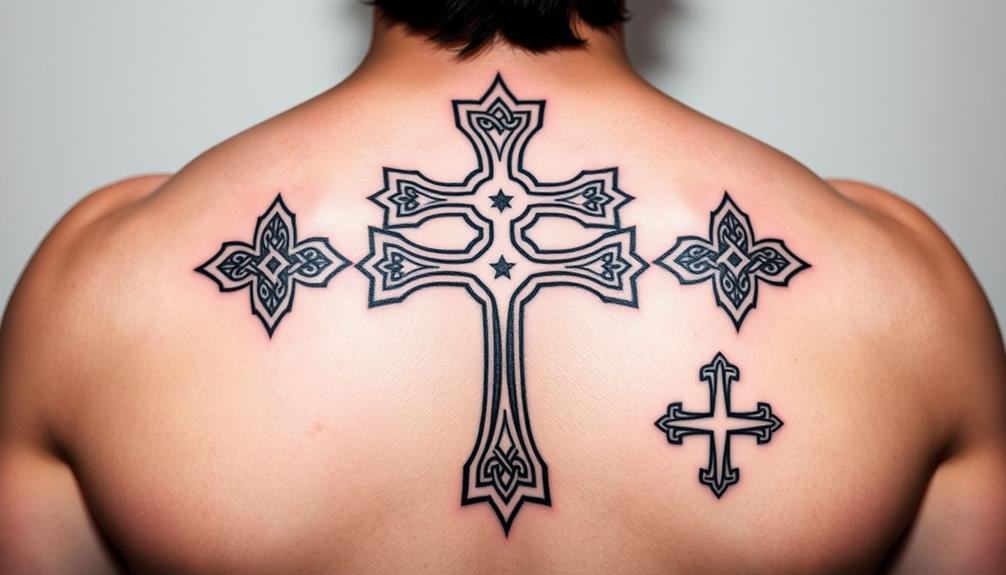
Selecting the perfect Jerusalem cross design for your tattoo is a deeply personal expedition. As you set forth on this voyage, let your heart guide you through the myriad of design preferences and cultural influences that shape your unique vision.
Each element you choose, from the intricacy of the cross to the symbols that accompany it, will be a reflection of your faith and your story.
Don't be afraid to let your creativity run wild as you investigate the rich fabric of history and artistry that surrounds the Jerusalem cross.
Whether you're drawn to the classic simplicity of the original design or the elaborate variations that have emerged over time, there's a design out there that will speak to your soul.
Placement and Size Considerations
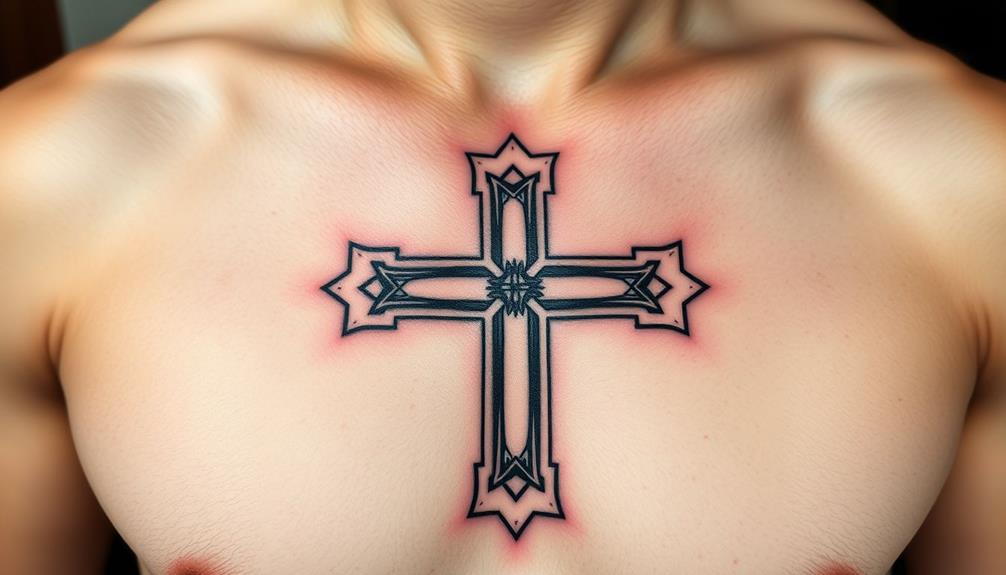
When it comes to placement and size considerations for your Jerusalem cross tattoo, think carefully about where you want it to reside on your body. The possibilities are vast, and I'll help you guide through them.
- Consider the tattoo's visibility. Do you want it to be a constant reminder of your faith, or a more private symbol?
- Think about your pain tolerance. Some areas, like the ribs or feet, are more sensitive than others.
- Reflect on size variations. A smaller tattoo might be more appropriate for your wrist, while a larger one could work well on your back.
- Placement options should also take into account your lifestyle and profession. If you need to cover it up often, choose a spot that's easily concealable.
- Lastly, remember that your body is a canvas. The Jerusalem cross, with its rich symbolism, deserves a place of honor that reflects your personal experience and faith.
Take your time with this decision. It's a permanent representation of your spiritual odyssey, after all.
Inspiring Jerusalem Cross Tattoos
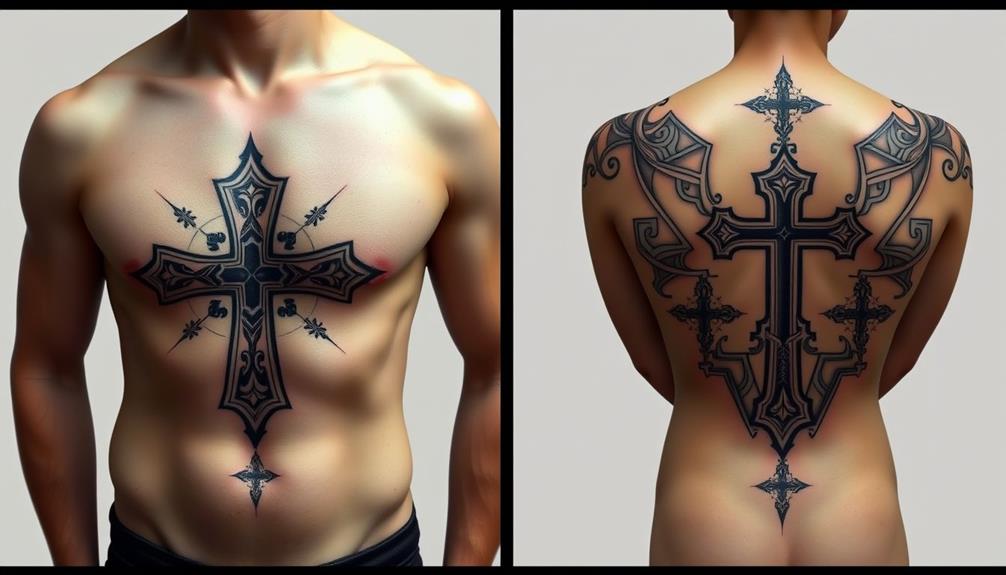
I find the historical significance of Jerusalem cross tattoos fascinating, as they date back to the Crusades and symbolize the Christian faith.
Each element of the cross holds deep meaning, with the five crosses representing the five wounds of Christ.
I've heard personal testimonies from individuals who've chosen this design to reflect their spiritual path and commitment to their beliefs.
Historical Significance
The Jerusalem cross, a symbol steeped in rich history, has inspired countless tattoo designs. As I explore the historical significance of this iconic symbol, I'm struck by the depth of its meaning and the ancient traditions that have shaped it over centuries.
- Rooted in medieval Christianity, the Jerusalem cross represents the five wounds of Christ, reminding us of His sacrifices and our faith.
- Crusaders adopted this symbol during their quests to the Holy Land, embodying their devotion and commitment to their cause.
- Throughout history, the Jerusalem cross has been used in the coat of arms and flags of various Christian kingdoms, signifying their allegiance to the church.
- Cultural influences from the Middle East and Europe have shaped the design and interpretation of the Jerusalem cross, blending diverse artistic styles and traditions.
- Today, the Jerusalem cross continues to inspire tattoo designs that pay homage to its historical roots while allowing for personal expression and individuality.
Symbolic Elements
Amidst the various elements that compose the Jerusalem cross, each carries its own significant symbolism. The central cross, often larger than the others, represents Christ, while the four smaller crosses symbolize the four evangelists who spread his message to the four corners of the world. This arrangement also reflects the five wounds of Christ during his crucifixion.
Incorporating cultural influences, Jerusalem cross tattoos often feature additional design elements like the crown of thorns or the INRI inscription, further emphasizing the Christian significance. Some design variations even include a scallop shell, a symbol commonly associated with the Camino de Santiago, a famous Christian pilgrimage.
The Jerusalem cross isn't just a symbol of faith but also a reminder of the rich history and the deep impact of Christianity. It encapsulates the essence of devotion, sacrifice, and the global reach of Christ's message.
As you consider getting a Jerusalem cross tattoo, I encourage you to reflect on the elements that connect with your personal faith experience and choose a design that holds significant meaning for you.
Personal Testimonies
Within the domain of personal narratives, the Jerusalem cross tattoo holds deep significance for many individuals. I've seen how this symbol encapsulates their faith odysseys and personal connections in meaningful ways.
- For some, it's a constant reminder of their pilgrimage to the Holy Land, etching the experience permanently into their skin and soul.
- Others view it as a symbol of their steadfast faith, a badge of honor they wear proudly.
- I've witnessed the Jerusalem cross serving as a memorial, commemorating loved ones who've passed on but remain forever in their hearts.
- It can also symbolize a commitment to living a life of service, embodying the altruistic spirit of the original Crusaders.
- Many find solace in its presence during difficult times, drawing strength from its enduring emblem of hope.
Through my encounters with those who bear this sacred ink, I've come to appreciate the intricate nature of the Jerusalem cross tattoo. It's more than just a design; it's a deeply personal expression of one's spiritual path and a powerful symbol of the resilience of the human spirit.
Frequently Asked Questions
How Much Does a Jerusalem Cross Tattoo Typically Cost?
The cost of a Jerusalem cross tattoo varies based on design complexity and size. I can range from $50 to $200. The historical significance and design variations add to the price, as it requires an experienced artist.
How Long Does It Take to Get a Jerusalem Cross Tattoo?
Getting a Jerusalem cross tattoo usually takes 1-3 hours, depending on the size and intricacy of the design. Tattoo placement and design variations can affect the time it takes. Intricate designs or larger pieces may take longer to complete.
Do Jerusalem Cross Tattoos Require Special Aftercare?
Your Jerusalem cross tattoo needs proper aftercare to heal well. I'll give you guidelines to follow during the healing process. It's not drastically different from other tattoos, but attention to detail is key for the best results.
Can I Get a Jerusalem Cross Tattoo if I'm Not Religious?
Absolutely, you can get a Jerusalem cross tattoo even if you're not religious. It's all about the symbolic significance and personal meaning it holds for you. I believe tattoos should reflect your unique path and what echoes with your soul.
Are There Any Cultural Sensitivities to Consider With Jerusalem Cross Tattoos?
I'd caution that the Jerusalem cross carries deep cultural and religious significance. While I'm not religious myself, I recognize its symbolic weight. It's essential to approach such a tattoo with respect and understanding of its meaning to others.
